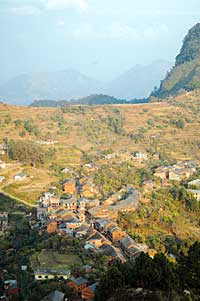 As the pale winter sun goes down, the 400 km of horizon to the north turns golden, then pink, then a grayish shade of mauve.
As the pale winter sun goes down, the 400 km of horizon to the north turns golden, then pink, then a grayish shade of mauve. You heard it here first: your life is not complete without experiencing a sunset from Bandipur's Chimkeswari hill. From high up on this ancient hilltop kingdom, the Gorkha valley below is enveloped in a gathering darkness below the icy knife-edge of Himalchuli. Then, dazzlingly, a huge coin of a full moon comes up from behind Ganesh Himal in the east.
Bandipur is Nepal's best kept secret: situated half-way between Kathmandu and Pokhara, it is one of the most scenic spots in Nepal. It is very accessible with only a 20-minute climb up a new asphalt road from Dumre but hardly anyone goes there.
Bandipur used to be a Magar kingdom long before Prithbi Narayan Shah embarked on his conquest to unify Nepal. Being close to Gorkha, Bandipur fell fairly quickly and in later centuries was settled by Newari traders from Kathmandu Valley who brought art, culture and architecture that have remained intact in the bajar.
Time stands still in Bandipur. Except for the road, electricity and the dress of the people, nothing has really changed here since the days Nepal became Nepal. In 1959 when King Mahendra visited Bandipur he became so enamoured that he extolled its beauty and serenity in the lyrics of the famous song, "Bandipurey Ukalo Lamo, Marsyangdi Dunga Le Tarera".
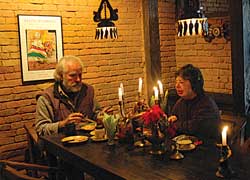 Bandipureys still talk about its glory days as a Magar kingdom ruled by King Mukunda Sen. They brought in Brahmin advisers from Lamjung and after the Shah conquest, Newars from Bhaktapur migrated here to establish the garment cottage industry.
Bandipureys still talk about its glory days as a Magar kingdom ruled by King Mukunda Sen. They brought in Brahmin advisers from Lamjung and after the Shah conquest, Newars from Bhaktapur migrated here to establish the garment cottage industry. Bandipur became so popular as business flourished that it soon became a trading centre for Gorkha, Kaski, Tanahu, Lamjung and Manang districts. When Indian mills started producing cheaper cloth, it affected Bandipur to such an extent that in the early 1900s, the industry closed down.
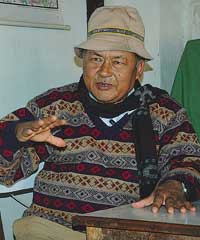 Bandipur returned to its early seclusion when the district headquarters of Tanahun was shifted back to Damauli. And the town became even more of a boondock when the Prithbi Highway bypassed it. Many of Bandipur's Newar traders have now moved down to Narayanghat or Kathmandu. Still, Bandipur retains its cosmopolitan heritage and is a harmonious mixture of Magars, Bahuns, Newars and recent Gurung settlers.
Bandipur returned to its early seclusion when the district headquarters of Tanahun was shifted back to Damauli. And the town became even more of a boondock when the Prithbi Highway bypassed it. Many of Bandipur's Newar traders have now moved down to Narayanghat or Kathmandu. Still, Bandipur retains its cosmopolitan heritage and is a harmonious mixture of Magars, Bahuns, Newars and recent Gurung settlers. "Suddenly, it felt like the place was dying," Mani Kumar Pradhan recalls his grandfather telling him. Pradhan belongs to the sixth generation of Newar migrants to Bandipur and is glad that with the road, Bandipur will be vibrant again. Bandipur's elders want to turn the town into a tourism and education centre like Darjeeling. But any visitor will tell you Bandipur has an edge: it is much prettier than Darjeeling.
Tourism is already picking up. A band of sophisticated tourists have discovered the place and keep coming back after their trek to relax. Pradhan's house used to be empty, now he is booked. "I used to pay people to stay and look after my house," says Pradhan, "Today, tenants are willing to pay Rs 1,000 for one room."
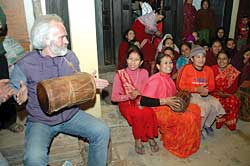 The establishment of the Notre Dame School by a handful of Japanese missionaries (see 'Bandipur sisters', #230) has helped establish Bandipur as an educational centre with students from all over the surrounding districts. Locals opened several private hostels for the boarding students. Says Krishna Kumar Pradhan, teacher: "Notre Dame brought education and jobs, we owe them a lot." The school reopened after townspeople put pressure on the Maoists who had closed it down. The Maoist presence here is virtually nil and since the security forces moved out it has been peaceful.
The establishment of the Notre Dame School by a handful of Japanese missionaries (see 'Bandipur sisters', #230) has helped establish Bandipur as an educational centre with students from all over the surrounding districts. Locals opened several private hostels for the boarding students. Says Krishna Kumar Pradhan, teacher: "Notre Dame brought education and jobs, we owe them a lot." The school reopened after townspeople put pressure on the Maoists who had closed it down. The Maoist presence here is virtually nil and since the security forces moved out it has been peaceful. 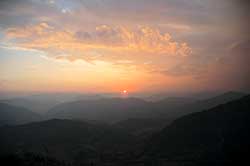 American Peace Corps volunteers who worked here since the early 60s were among the first to promote Bandipur as a tourist destination. "The main attraction is that tourists get the taste of an old Nepali town amidst grand scenery," explains Ram Charan Shrestha of the Old Inn, one of Bandipur's best hotels.
American Peace Corps volunteers who worked here since the early 60s were among the first to promote Bandipur as a tourist destination. "The main attraction is that tourists get the taste of an old Nepali town amidst grand scenery," explains Ram Charan Shrestha of the Old Inn, one of Bandipur's best hotels. The peaceful ambience of Bandipur is evident in the fact that there is no curfew, the shops are open till late and the festivals are celebrated with passion. "Nobody is afraid in Bandipur," says Kala, a student going off to school, "There is no one with guns here."


